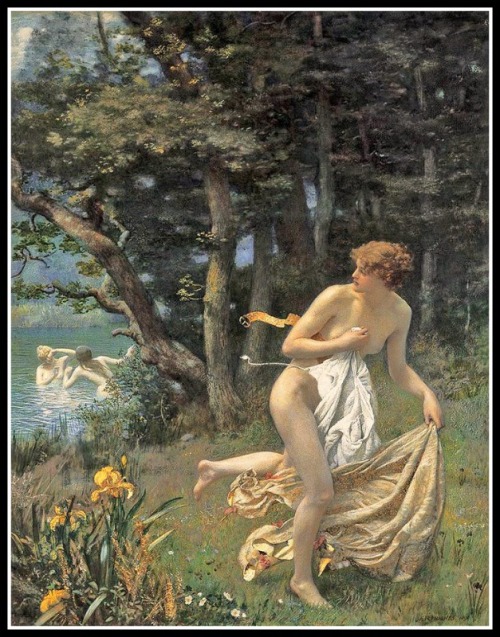Aubade
Go warn the moon
the sun is coming.
I hear the rooster
clearing his throat.
Go warn the moon;
don’t let the sun
catch her unwary,
baring her cheeks.
Go warn the moon:
too late; too late.
The rooster is crowing.
The moon is blushing.

Diana’s Maidens -- Edward Robert Hughes
Go warn the moon
the sun is coming.
I hear the rooster
clearing his throat.
Go warn the moon;
don’t let the sun
catch her unwary,
baring her cheeks.
Go warn the moon:
too late; too late.
The rooster is crowing.
The moon is blushing.

Diana’s Maidens -- Edward Robert Hughes
In the strictest sense of the term, an aubade is a song from a door or window to a sleeping woman. But generally speaking it is is a song or instrumental composition evoking daybreak; often it is a morning love song and is conflated with the alba, an Occitan/Provençal verse form from the 8th through the 14th centuries; it featured a watchman warning parting lovers that dawn approached.
ReplyDeleteIn Greco-Roman mythology, two separate goddesses, Artemis and Diana, merged. The linguistic origins of Artemis are vague, though in "Cratylus" Platon related her name to "artemes" (safe, unharmed, uninjured, pure, "the stainless maiden.") Diana was an adjectival form developed from an ancient "divios," which corresponded to the later "divus" or "dius" and the neuter form "dium" (sky); the word was rooted in the Indoeuropean word for bright sky or daylight, from which also derived the name of Vedic god Dyaus and the Latin deus, (god), dies, (day, daylight), and "diurnal" (daytime); in the 1st centuy BCE, Marcus Terentius Varro and Marcus Tullius Cicero related Diana's name to "dies" and connected it to the shine of the moon, though her identification as a moon goddess was a late development. Both deities were goddesses of the hunt and nature and as a virgin goddess of childbirth and women. In the 3rd century BCE, Kallimakhos dedicated a poem to the goddess "who amuses herself on mountains with archery" and claimed that when she was three she asked Zeus her father to grant her six wishes: to remain always a virgin, to have many names to set her apart from her brother Apollo the sun god, to be the Phaesporia or Light Bringer, to have a bow and arrow so that she could hunt, to have 60 "daughters of Okeanos" as her choir, and 20 Amnisides nymphs as handmaidens to watch her dogs and bow while she rested. All of her companions also remained virgins, and Artemis closely guarded her own chastity. In Stregheria, an Italian-American form of witchcraft developed by Raven Grimassi in the 1980s, Diana is regarded as the creator of the world , having in herself the seeds of all creation yet to come; out of herself she divided the darkness and the light (Apollo), keeping for herself the darkness of creation.